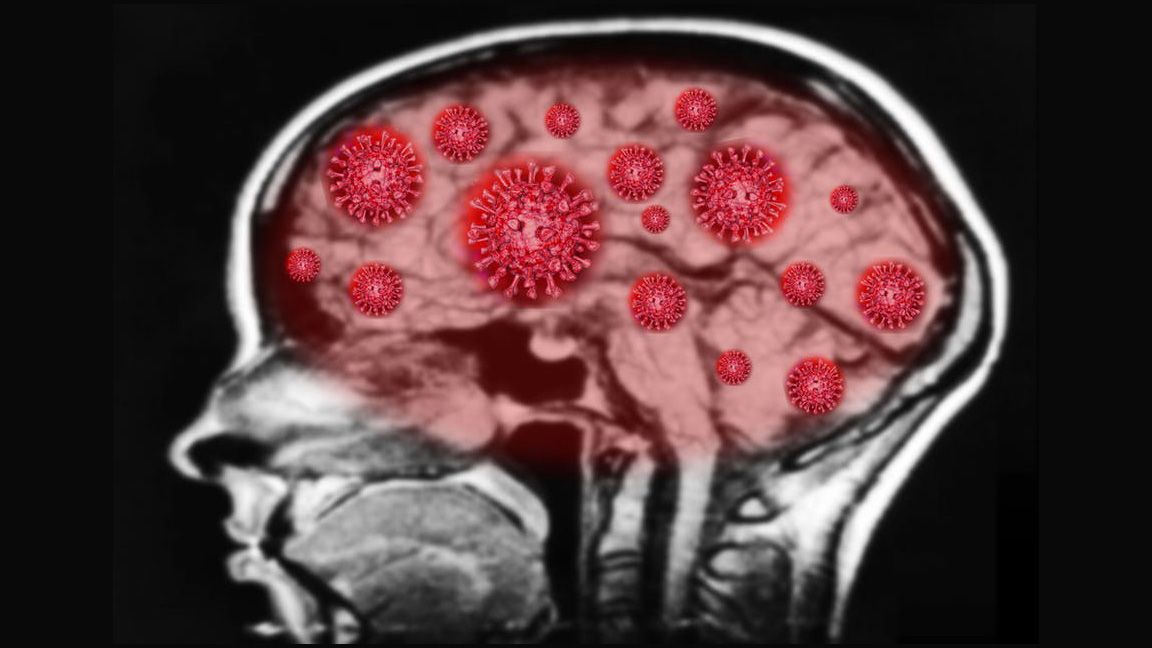Studies have previously found that up to 84 percent of Covid-19 patients suffer from neurological symptoms, anosmia (loss of sense of taste or smell), epileptic seizures, strokes, loss of consciousness, and confusion.
A new study has found that Covid-19 can damage specific brain cells known as endothelial cells. And this could explain why 84 percent of Covid-19 patients claim neurological symptoms.
There's hope that the damage may be reversible, the study suggested.
The study, conducted by scientists from Germany, France, and Spain, reveals that Covid-19 can kill brain cells known as endothelial cells.
Studies have previously found that up to 84 percent of Covid-19 patients suffer from neurological symptoms, anosmia (loss of sense of taste or smell), epileptic seizures, strokes, loss of consciousness, and confusion.
The study was conducted by scanning the brains of corpses who had died from Covid-19.
The results of the research showed string vessels, a dead cell that cannot allow blood to flow, and is a sign of cognitive impairment, and has numerous medical risks, including micro strokes.
There is hope, however, that this new facet of Covid-19 may be reversible.
"We have seen that in hamsters, who develop very minor forms of Covid-19, the phenomenon is apparently reversible, so we can hope that it could also be reversible in humans," a co-author of the paper, Vincent Prévot, from the Inserm research center in Lille, told RFI news.
In some people, response to the coronavirus has been shown to increase the risk of stroke, dementia, muscle and nerve damage, encephalitis, and vascular disorders.
UK study
Covid-19 itself can lead to neurological and mental complications, such as delirium, agitation, and stroke.
People with pre-existing mental, neurological or substance use disorders are also more vulnerable to SARS-CoV-2 infection ̶ they may stand a higher risk of severe outcomes and even death.
Benedict Michael, a neurologist at the University of Liverpool, UK and his team were among many scientists who began compiling case reports of neurological complications linked to Covid-19.
In a June paper, he and his team analyzed clinical details for 125 people in the United Kingdom with Covid-19 who had neurological or psychiatric effects.
Of these, 62 percent had experienced damage to the brain’s blood supply, such as strokes and hemorrhages, and 31 percent had altered mental states, such as confusion or prolonged unconsciousness — sometimes accompanied by encephalitis, the swelling of brain tissue.
Ten people who had altered mental states developed psychosis.
Not all people with neurological symptoms have been seriously ill in intensive-care units, either.
“We’ve seen this group of younger people without conventional risk factors who are having strokes, and patients having acute changes in mental status that are not otherwise explained,” says Michael.
A similar study published in July compiled detailed case reports of 43 people with neurological complications from Covid-19.
Some patterns are becoming clear, says Michael Zandi, a neurologist at University College London and a lead author on the study. The most common neurological effects are stroke and encephalitis.
Encephalitis can escalate to a severe form called acute disseminated encephalomyelitis, in which both the brain and spinal cord become inflamed and neurons lose their myelin coatings — leading to symptoms resembling those of multiple sclerosis.
Some of the worst-affected patients had only mild respiratory symptoms. “This was the brain being hit as their main disease,” says Zandi.
Less common complications include peripheral nerve damage, typical of Guillain–Barré syndrome, and what Zandi calls “a hodgepodge of things,” such as anxiety and post-traumatic stress disorder.
Similar symptoms have been seen in outbreaks of severe acute respiratory syndrome (SARS) and Middle East respiratory syndrome (MERS), also caused by coronaviruses.
But fewer people were infected in those outbreaks, so less data are available.
Tags: #Covid19, #braindamage, #longtermeffects, #neurologicaldiseases
